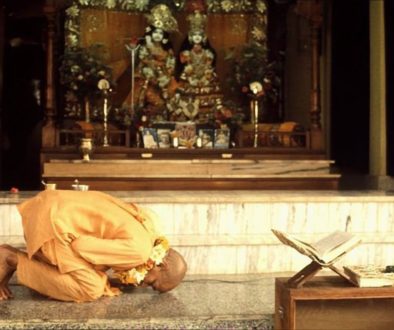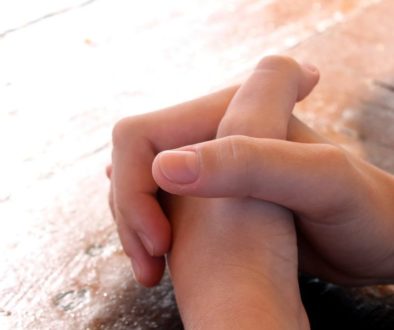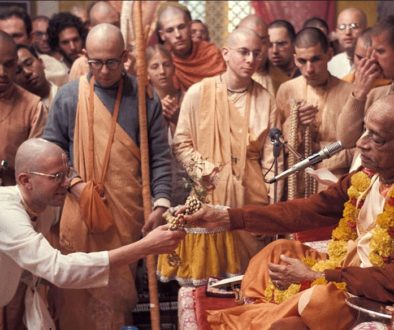Illuminations 13 – Living a life of total Forgiveness
In this issue we talk about forgiveness. Forgiving those who have hurt you can be difficult. In some cases it may even seem impossible. The purpose of this article is to encourage and help you on the path of forgiving every person or organization whom has ever hurt or offended you.
Some claim that forgiving is like a spiritual panacea, that when you forgive you will feel purified and liberated.
May you always think of Krsna,
Mahatma Das
_________________________________________________________________________________
Living a Life of Total Forgiveness
How Much Can We Forgive?
The scriptures are full of stories of forgiveness. Srila Prabhuapda writes, “The duty of a brahmana is to culture the quality of forgiveness, which is illuminating like the sun. The Supreme Personality of Godhead, Hari, is pleased with those who are forgiving.”
Most of the stories in scripture are about extraordinary acts of forgiveness, the kind of forgiveness that seems possible only for exalted devotees. Arjuna was willing to forgive the atrocious offences the Kurus committed against him and his brothers. Prahlada Maharaja forgave his father even though his father repeatedly tried to mercilessly kill him. He even prayed for his liberation. Ambarisa Maharaja, who simply tried to serve Durvasa Muni, forgave Durvasa even though he tried to kill Ambarisa for no reason. Lord Jesus Christ forgave those who attempted to kill him. Haridas Thakura prayed for the well being of those who were trying to beat him to death. Nityananda Prabhu forgave Jagai and Madhai and begged Lord Caitanya to deliver them.
When you hear these stories you may think that this kind of forgiveness is reserved for highly advanced devotees. I thought that way for years. But two things I learned changed that attitude.
A devotee told me a story about a boy who was flirting with a girl in a bar. The girl became so enraged with the boy that she took out a knife and stabbed him to death. Now imagine how you would feel if you were the boy’s mother. But his mother did something quite amazing: she decided to help the girl. She regularly visited this girl in jail and made it her mission to comfort this woman and help her overcome her problems. Here was a woman who was not a Jesus Christ, a Prahlada Maharaja, an Ambarisa Maharaja, but she had it in her to forgive a girl who murdered her son for no reason.
I used to think that forgiving minor offences is one thing, but forgiving those who have hurt me deeply is a totally different thing. Hearing this story began to change my way of thinking.
Forgiveness is a Choice
The other thing that changed the way I thought about forgiveness was a statement I read that said, “Forgiveness is a choice.” My first reaction was, “No, that’s not true. In my life I have been hurt so deeply by some that it is not possible for me to fully forgive them.” But as I contemplated my hurt and reflected on this statement, I realized that I really didn’t want to acknowledge the truth of these words because I was choosing not to forgive.
I WAS ATTACHED TO MY RESENTMENT. IT WAS MY WEAPON AGAINST THOSE WHO HURT ME.
Is it difficult to totally forgive? It can seem impossible. Totally forgiving someone that deeply hurt you can be one of the most difficult things you’ll ever attempt to do. But no matter how you rationalize it, it is a choice.
A Devotee is Always Ready to Forgive
Prabhupada writes, “Krsna never tolerates offences committed at the lotus feet of a pure Vaisnava. A Vasnava, however, is always ready to forgive such offences. “Always ready” implies that forgiveness is unconditional and that a devotee totally forgives.
A devotee doesn’t think, “I can only forgive this person a little, this one 50%, and that one 99%. When Prabhupada speaks about forgiveness he means TOTAL forgiveness.
Do we forgive in order to re-establish a better relationship with the person who hurt us? Not always. Often those who have hurt or offended us are not aware they have done anything wrong. In those cases, if we let them know we have forgiven them it will just make matters worse.
Although forgiveness is tremendously beneficial for us, freeing our hearts from pent up anger and resentment, ultimately we forgive because it is the right thing to do. Prabhupada writes, “It is said that forgiveness is a quality of those who are advancing in spiritual knowledge.” We are meant to cultivate this quality. We are meant to CHOOSE to practice forgiveness. And to cultivate forgiveness we must choose to forgive continually, not just once. We practice forgiveness because we value our relationship with Krsna more than we desire to see our enemy punished.
The greater the offence you must forgive, the greater the mercy you will get. It takes great spiritual strength to forgive an individual or organization that has deeply hurt you.
YOU ARE ACTUALLY FORTUNATE IF SOMEONE OFFENDS OR HURTS YOU BECAUSE IT GIVES YOU THE OPPORTUNITY TO MAKE GREAT SPIRITUAL ADVANCEMENT.
The Test of Total Forgiveness
How do you know you have totally forgiven? To answer this question let’s look at what unforgiveness looks like. It comes as resentment, when you hold a grudge and become inwardly bitter. You become preoccupied with hate and self-pity. You can’t come to terms with the fact that the person who committed such a horrible act against you will not get caught, exposed, or receive negative reactions for their behaviour. You want the world to see what they’ve done wrong. Then you go over and over in your mind what the offender did, recounting and re-living exactly what happened. All of this leads to wanting to get even.
Sometimes we don’t forgive because we want to punish the other person for what they have done. But the reality is that we are only punishing ourselves. It is said that envy is like drinking poison and hoping the other person will die. Until you totally forgive, you will be in chains. Totally release them and you will be released. Nelson Mandella said, “If you hate, you will give your “enemy” your heart and mind.”
 TO FORGIVE IS TO SET THE PRISONER FREE AND THEN REALIZE THE PRISONER WAS YOU.
TO FORGIVE IS TO SET THE PRISONER FREE AND THEN REALIZE THE PRISONER WAS YOU.
When you totally forgive someone, you refuse to keep a record of their wrongs. And you refuse to keep a record of how right you were, the record used to vindicate yourself.
Forgive and You Will Be Forgiven
How would you be doing now if you were only forgiven for your past sins and mistakes to the exact degree that you have forgiven others?
THE PROBLEM IS THAT TOO OFTEN WE WANT MERCY FOR OURSELVES BUT WE WANT JUSTICE FOR OTHERS.
Now you may ask, “Who must I forgive and must I forgive everyone?” First, it is important to understand that forgiving and wanting a criminal who could harm others to be arrested are compatible. Let’s say a person committed a criminal act against you or a family member. You can personally forgive the person and at the same time be involved in prosecuting the person. For the welfare of that person and others it may be best that they are punished in some way. Forgiveness doesn’t mean you have to make a wrong a right. It means you release yourself from the resentment you feel towards the offender. You pray to Krsna to forgive them and bless them. Is that a lot to ask? Yes. But otherwise the resentment you maintain will continue to harm you, not only spiritually, but emotionally and physically (according to oriental medicine, anger and resentment negatively affect specific organs in the body).
I know that if I make a mistake, offend someone or hurt someone, I certainly want to be forgiven. I want others to know that I sometimes make mistakes due to my conditioning, but my intention is not to do wrong. I want others to know I try my best even though I am not perfect. I wouldn’t object if those who I offended prayed for my well being (and they may have done this for all I know). Therefore, certainly I should grant that same consideration and mercy to others.
When Srila Bhaktisiddhanta Sarasavati was approached by his disciples with complaints about others, he would ask, “Is there anything good about that person?” They would think for a moment and mention some good qualities the person had. He would then say, “Then focus on that.”
Bless Your Enemy
Total forgiveness involves praying for Krsna’s blessings to rain on the lives of your offenders. In other words, you pray that they will be dealt with as you want God to deal with you. And it is not total forgiveness unless you really mean it and never turn back to condemn, criticize, wish that person gets their due rewards, or want that person to feel bad about what they’ve done. If they receive the blessings you prayed for, you will be happy if you have truly forgiven them. If you haven’t totally forgiven them, you will be unhappy to see them prosper.
Will you forgive those who have hurt and offended you?
If you don’t forgive you are also guilty; guilty of the crime of unforgiveness.
Exercise
- Think of the person or group you want to forgive (some people even need to forgive God of their gurus). Make the choice to totally forgive them and begin to release any resentment, hatred, or grudges you have towards them. If you can’t do this fully, do it as much as you can. If you can’t do much, do a little.
- Next imagine this person is seated in front of you. Glorify them. Appreciate them for their good qualities and activities (if it is a group or organization that has offended you, do the above to the organization or group).
- Ask Krsna to bless their lives in every way possible.
If this sounds too difficult to do, just forgive them for one day, or one hour, or even one minute. Then observe how this feels and how it helps you. Then decide if you wish to bring the hatred, resentment, and bad feelings towards them back into your heart or if you wish to continue to forgive.
Do this for as many people, groups or organizations as necessary. If any negative thoughts come up or if you feel the need to express these thoughts to others, you will know you have not yet totally forgiven. If this is the case, repeat the process as many times as needed in order to totally forgive.
- Ask yourself what is it in you that will not allow you to totally forgive and if and how this plays out in other relationships (what beliefs do you have that do not allow you to totally forgive and do you want to change these beliefs?).
You life will improve in many ways as soon as you start the forgiving process.


